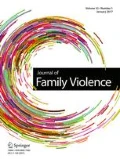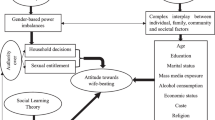Abstract
Pakistani women are vulnerable to all kinds of violence due to the patriarchal setup of society. We examined the justification of wife beating by women and men of reproductive group that comprised of 15–49 years of age by doing secondary data analysis on nationally representative cross- sectional survey data from the Pakistan Demographic and Health Survey, 2012–13. The analysis was conducted on randomly selected 13,558 ever- married women and 3134 ever- married men representing all the four provinces of Pakistan including Gilgit Baltistan and federal capital Islamabad. The data showed that women justified wife beating more as compared to men. The findings of multivariable logistic regression depicted that women living with partners, having no access to information, lacking autonomy, and no control over income were more likely to justify wife beating while men who did not have access to information were more in favor of this acts. These findings may help in devising strategies to change the mindset regarding justification of wife beating in Pakistan.
Similar content being viewed by others
References
Aizer, A. (2010). The gender wage gap and domestic violence. American Economic Review, 100(4), 1847–1859. doi:10.1257/aer.100.4.1847.
Ali, S. T., Asad, N., Mogren, I., & Krantz, G. (2011). Intimate partner violence in urban Pakistan: Prevalence, frequency and risk factors. International Journal of Women’s Health, 3, 105–115. doi:10.2147/IJWH.S17016.
Ammar, N. H. (2006). Beyond the shadows: Domestic spousal violence in a “democratizing” Egypt. Trauma, violence and Abuse, 7(4), 244–259.
Bhattacharyya, M., Bedi, S. A., & Chhachhi, A. (2011). Martial violence and women’s employment and property status: Evidence from north Indian villages. World Development, 39(9), 1676–1689. doi:10.1016/j.worlddev.2011.02.001.
Blood, R. O., & Wolfe, D. M. (1960). Husbands and wives: Dynamics of married living. New York: The Free Press.
Calvete, E. (2007). Justification of violence, beliefs and social problem-solving as mediators between maltreatment and behavior problems in adolescents. The Spanish Journal of Psychology, 10(1), 131–140.
Connell, R. W. (2002). Gender. Cambridge: Polity Press.
Dalal, K., Lee, S. M., & Gifford, M. (2011). Male adolescents’ attitudes toward wife beating: A multi-country study in South Asia. Journal of Adolescent Health, 50(5), 437–442. doi:10.1016/j.jadohealth.2011.09.012.
Dekeseredy, W. S. (2011). Feminist contributions to understanding woman abuse: Myths, controversies, and realties. Aggression and Violent Behavior, 16, 297–302 Retrieved from http://www.xyonline.net/sites/default/files/DeKeseredy,%20Feminist%20contributions-to-understanding-woman-abuse-Myths,-controversies,-and-realities_2011.pdf.
Gelles, R. J. (1980). Violence in the family; a review of research in the seventies. Journal of Marriage and Family, 42(4), 873–885.
Ghuman, S. J., Lee, H. J., & Smith, H. L. (2006). Measurement of women's autonomy according to women and their husbands: Results from five Asian countries. Social Science Research, 35(1), 1–28. doi:10.1016/j.ssresearch.2004.06.001.
Gracia-Moreno, C., Jansen, H. A. F. M., Ellsberg, M., Heise, L. L., & Watts, C. H. (2005). WHO, multicounty study on women’s health and domestic violence against women: Initials results on prevalence, health outcomes, and women’s responses. Switzerland: World Health Organization.
Haider, S. (2013). Pakistan second-worst country in gender equality: WEF. In Dawn .Retrieved from www.dawn.com/news/1051796
Henning, K., Jones, A. R., & Holdford, R. (2005). “I didn’t do it, but if I did I had a good reason”: Minimization, denial, and attributions of blame among male and female domestic violence offenders. Journal of Family Violence, 20(3), 131–139. doi:10.1007/s10896-005-3647-8.
Hidrobo, M., & Fernald, L. (2013). Cash transfers and domestic violence. Journal of Health Economics, 32(1), 304–319.
Hunnicutt, G. (2009). Varieties of patriarchy and violence against women resurrecting “patriarchy” as a theoretical tool. Violence Against Women, 15, 553–573.
Jejeebhoy, S. J. (1998). Wife-beating in rural India: A husband’s right? Evidence from survey data. Economic and Political Weekly, 33(15), 855–862.
Linos, N., Khawaja, M., & Al-Nsour, M. (2010). Women’s autonomy and support for wife beating: Findings from a population-based survey in Jordan. Violence and Victims, 25(3), 409–419.
Nasrullah, M., Zakar, R., & Zakar, M. Z. (2014). Child marriage and its associations with controlling behaviors and spousal violence against adolescent and young women in Pakistan. Journal of Adolescent Health, 55(6), 804–809.
National Institute of Population Studies and ICF International. (2013). Pakistan demographic and health survey 2012–13 .Retrieved from https://dhsprogram.com/pubs/pdf/FR290/FR290.pdf
Ovais, M. (2014). Education will not end wife beating, Pakistan needs a cultural shift. [Web log post]. Retrieved from http://blogs.tribune.com.pk/story/20088/education-will-not-end-wife-beating-pakistan-needs-a-cultural-shift/
Pena, G. M., Balacza, N. P., Esuivel-Santovena, E. E., Chimal, M. A., Valdes, M. E. J., & Lopez, G. J. (2012). Justification of domestic violence by Mexican women. Psychology Research, 2(12), 737–743.
Rabbani, F., Qureshi, F., & Rizvi, N. (2008). Perspective on domestic violence: Case study from Karachi, Pakistan. Eastern Mediterranean Health Journal, 14(2), 415–425.
Rani, M., & Bonu, S. (2009). Attitudes toward wife beating: A cross- country study in Asia. Journal of Interpersonal Violence, 24(8), 1371–1397. doi:10.1177/0886260508322182.
Rashid, M., Manzur, K., Nirmala, K. P. P., & Arpana, S. (2014). Wife beating: A population-based study in Bangladesh. Violence and Gender, 1(4), 170–175. doi:10.1089/vio.2014.0015.
Richie, B. (1996). Compelled to crime: The gender entrapment of battered black women. New York: Routledge.
Saunders, D. G., & Hamill, R. M. (2003). Violence against women: Synthesis of research on offender interventions. Washington, DC: National Institute of Justice, US Department of Justice
Schuler, S. R., & Islam, F. (2008). Women’s acceptance of intimate partner violence within marriage in rural Bangladesh. Studies in Family Planning, 39(1), 49–58. doi:10.1111/j.1728-4465.2008.00150.x.
Shah, M. M., Alam, N., Hassan, Q., Khan, S., Qayum, I., Bahadur, S., & Khalil, H. Z. (2012). Death in the home: Domestic violence against women in Khyber Pakhtunkhwa. Journal of Ayub Medical College Abbotabad, 24(1), 48–51.
Sidiki, A. (2014). 34% of women say men are justified in hitting wives if they argue back: Pakistan survey. The Express Tribune with The International New York Times. Retrieved from http://tribune.com.pk/story/663321/34-of-women-believe-that-their-husbands-are-justified-to-hit-them-if-they-argue-with-him-survey
Standing Senate Committee on Agriculture and Forestry, Canada. (1993). Farm stress: Its economic dimension, its human consequences. .Retrieved from http://www.parl.gc.ca/Content/SEN/Committee/371/agri/rep/farm-stress-e.htm
United Nations. (2006). Ending violence against women: From words to action study of the Secretary-General. .Retrieved from http://www.un.org/womenwatch/daw/vaw/launch/english/v.a.w-exeE-use.pdf
Witter, J. (n.d). Men who beat women believe they are justified. Retrieved from http://www.villagelife.org/news/archives/DV_coverstory/DV_menjustified.html.
World Health Organization. (2002). World report on violence and health. .Retrieved from http://apps.who.int/iris/bitstream/10665/42495/1/9241545615_eng.pdf
Yodanis, C. L. (2004). Gender inequality, violence against women, and fear: A cross-national test of the feminist theory of violence against women. Journal of Interpersonal Violence, 19(6), 655–675.
Yount, M. K., & Li, L. (2009). Women’s justification of domestic violence in Egypt. Journal of Marriage and Family, 71(5), 1125–1140.
Zakar, R. (2012). Intimate partner violence against women and its implications for women's health in Pakistan (Doctoral dissertation). .Retrieved from https://pub.uni-bielefeld.de/publication/2532445
Zakar, R., Zakar, M. Z., & Abbas, S. (2016). Domestic violence against rural women in Pakistan: An issue of health and human rights. Journal of Family Violence, 31(1), 15–25.
Zakar, R., Zakar, M. Z., & Kramar, A. (2012). Voices of strength and struggle: Women’s coping strategies against spousal violence in Pakistan. Journal of Interpersonal Violence, 27(16), 3268–3298.
Zakar, R., Zakar, M. Z., & Kramar, A. (2013). Men’s beliefs and attitudes toward intimate partner violence against women in Pakistan. Violence Against Women, 19(2), 246–268.
Author information
Authors and Affiliations
Corresponding author
Rights and permissions
About this article
Cite this article
Tayyab, F., Kamal, N., Akbar, T. et al. Men and Women’s Perceptions of Justifications of Wife Beating: Evidence from Pakistan Demographic and Health Survey 2012–13. J Fam Viol 32, 721–730 (2017). https://doi.org/10.1007/s10896-017-9910-y
Published:
Issue Date:
DOI: https://doi.org/10.1007/s10896-017-9910-y




